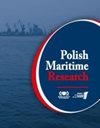考虑储能系统退化的氢燃料电池船能量管理策略
IF 2
3区 工程技术
Q2 ENGINEERING, MARINE
引用次数: 3
摘要
摘要为氢燃料电池船舶建立了一个包括氢燃料电池系统(FCS)和锂离子电池储能系统(ESS)的混合能源系统(HES),以跟踪快速负载瞬态。为了实现负载功率的合理分配,提高系统的稳定性,提出了一种分级控制的能量管理策略。在高控制回路中,提出了一种基于粒子群优化算法(PSO)和等效功耗最小化策略(ECMS)的功率分配机制。在低阶控制回路中,开发了一种自适应模糊PID控制器,通过实时调整PID参数,可以快速将系统恢复到稳定状态。与基于规则的EMS相比,氢消耗减少了5.319%,电力系统的稳定性显著提高。此外,还开发了ESS退化模型来评估其健康状态(SOH)。与PSO-ECMS相比,在不考虑ESS退化的情况下,ESS容量损失减少了2%,船舶的日常运营成本减少了1.7%。本文章由计算机程序翻译,如有差异,请以英文原文为准。
Energy Management Strategy Considering Energy Storage System Degradation for Hydrogen Fuel Cell Ship
Abstract A hybrid energy system (HES) including hydrogen fuel cell systems (FCS) and a lithium-ion (Li-ion) battery energy storage system (ESS) is established for hydrogen fuel cell ships to follow fast load transients. An energy management strategy (EMS) with hierarchical control is presented to achieve proper distribution of load power and enhance system stability. In the high-control loop, a power distribution mechanism based on a particle swarm optimization algorithm (PSO) with an equivalent consumption minimization strategy (ECMS) is proposed. In the low-level control loop, an adaptive fuzzy PID controller is developed, which can quickly restore the system to a stable state by adjusting the PID parameters in real time. Compared with the rule-based EMS, hydrogen consumption is reduced by 5.319%, and the stability of the power system is significantly improved. In addition, the ESS degradation model is developed to assess its state of health (SOH). The ESS capacity loss is reduced by 2% and the daily operating cost of the ship is reduced by 1.7% compared with the PSO-ECMS without considering the ESS degradation.
求助全文
通过发布文献求助,成功后即可免费获取论文全文。
去求助
来源期刊

Polish Maritime Research
工程技术-工程:海洋
CiteScore
3.70
自引率
45.00%
发文量
20
审稿时长
>12 weeks
期刊介绍:
The scope of the journal covers selected issues related to all phases of product lifecycle and corresponding technologies for offshore floating and fixed structures and their components.
All researchers are invited to submit their original papers for peer review and publications related to methods of the design; production and manufacturing; maintenance and operational processes of such technical items as:
all types of vessels and their equipment,
fixed and floating offshore units and their components,
autonomous underwater vehicle (AUV) and remotely operated vehicle (ROV).
We welcome submissions from these fields in the following technical topics:
ship hydrodynamics: buoyancy and stability; ship resistance and propulsion, etc.,
structural integrity of ship and offshore unit structures: materials; welding; fatigue and fracture, etc.,
marine equipment: ship and offshore unit power plants: overboarding equipment; etc.
 求助内容:
求助内容: 应助结果提醒方式:
应助结果提醒方式:


